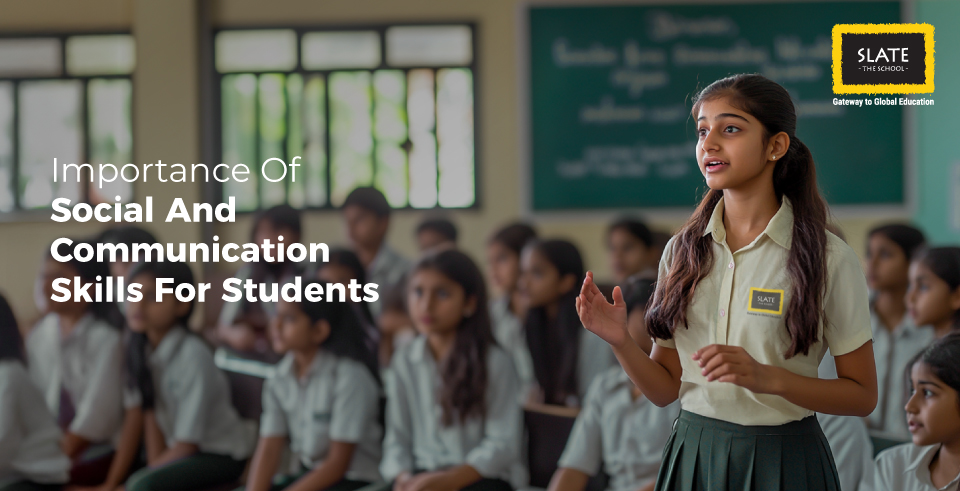The role of social skills in the life of a student cannot be overestimated in a world where everything is becoming more and more interconnected. As young students develop to become global citizens, their capability to learn to connect, collaborate, and communicate effectively turns out to be as vital as their academic performance. At Slate – The School, we believe that education should go beyond textbooks, nurturing every aspect of a child’s development, especially interpersonal and soft skills for students.
In education, social and communication skills in education form the prerequisite of emotional intelligence, teamwork, leadership and adaptability. These attributes will enable the students not only to excel in school but also in all areas of life. Let’s explore why developing these skills is crucial and how we at Slate incorporate them into our unique educational approach.
Understanding Social and Communication Skills
Social skills are the capabilities we employ in dealing with people as we communicate with them. These are non-verbal and verbal communication, ability to listen, empathy, working in a team and ability to solve conflicts peacefully. Student communication skills encompass the ability to express themselves articulately, listening attentively, empathizing with other points of view, and having valuable conversation skills.
These abilities contribute to the development of students’ interpersonal skills, enabling students to build positive relationships, collaborate in academic pursuits, and build a sense of belonging and confidence. They are not intrinsic; they are developed with the assistance of experience, instruction and systematic education.
Why Are These Skills Important for Students?
Enhanced Academic Performance
When students have good communication and social skills, they become more likely to pose questions, to seek assistance and to actively engage in classroom discussion. This interaction enhances understanding and educational outcomes and highlights the importance of social skills for students.
Stronger Peer Relationships
Relational skills with classmates have a positive impact on friendships and decrease bullying incidents. It establishes a very welcoming and respectful classroom atmosphere and strengthens student interpersonal skills.
Improved Emotional Wellbeing
Those students who can positively articulate their emotions and listen to others build stronger self-esteem and emotional control, a key outcome of nurturing soft skills for students.
Workplace Readiness
As future professionals, students need communication skills, such as negotiation, teamwork, leadership, and empathy. These begin developing in school through daily interactions, forming a part of the essential soft skills for students.
Conflict Resolution
Strong communication skills for students are needed to help them resolve conflicts calmly, understand others’ perspectives and find common ground.
How Slate – The School Promotes These Skills
At Slate, we recognise that social and communication skills in education are not separate from academics; they are integral to a student’s overall development. Our approach is holistic, ensuring students are nurtured to become confident, responsible, and articulate individuals.
- Collaborative Classrooms: Through group projects, debates, and role-playing activities, students learn to listen, contribute, and lead.
- Life Skills Programmes: Our Sampoornatha Program integrates emotional intelligence, mindfulness, and social etiquette, preparing students for life beyond school.
- Public Speaking Opportunities: Students are encouraged to speak at assemblies, participate in storytelling, and present ideas, building self-confidence and clear communication.
- Teacher Mentoring: Personalised attention helps identify social or emotional struggles early and offers support to overcome them.
Our Unique No-Smartphone Policy
In today’s digital age, excessive screen time can hinder face-to-face interaction and real-world communication skills for students. At Slate, we uphold a unique no-smartphone policy – not just on campus but in everyday life. Our students are not allowed to own smartphones at all.
This policy has a profound impact on their student interpersonal skills. Without the distractions of digital devices, students engage more with peers, enjoy deeper conversations, and develop stronger connections. Parents play a vital role by supporting this vision, ensuring that the benefits extend beyond the school environment.
Our Healthy Eating Habits Policy
Slate is also deeply committed to students’ physical and mental well-being. One of our standout policies is the strict ban on junk food. Again, this rule is not confined to the school campus. Students are encouraged to follow healthy eating practices in their daily lives, even at home.
Why does this matter in the context of social and communication skills in education? A healthy body supports a healthy mind. Balanced nutrition improves mood, energy levels, and focus – all of which enhance a student’s capacity to communicate and interact meaningfully.
Fostering Interpersonal Skills Beyond the Classroom
Beyond academic excellence, Slate ensures students learn:
- Empathy through Community Outreach: Volunteering and community-based projects help students understand diverse perspectives.
- Leadership through House Activities: Students take on responsibilities that develop negotiation and group management skills.
- Cultural Appreciation through Celebrations: Exposure to diverse cultures, traditions, and languages helps develop respect and inclusion.
These initiatives provide practical experiences that strengthen students’ interpersonal skills and build character.
A Future-Ready Approach at Slate
With cutting-edge initiatives like the SMAART and SAMPOORNATHA programmes, Slate goes beyond conventional schooling. The frameworks focus on the abilities that are needed in the modern world that changes rapidly: critical thinking, creativity, emotional intelligence, and digital awareness.
SAMPOORNATHA, more specifically, dwells upon Social Intelligence, Communication Skills for Students, Emotional Intelligence, and Leadership, which are the key ingredients of successful interpersonal relationships. This not only makes the students academically ready but also emotionally fit to survive in any environment.
Conclusion
The importance of social skills for students goes beyond the school walls. Communication, empathy, and collaboration are central to surviving in life. At Slate – The School, we believe that we are not only preparing students to pass exams but to live a fulfilling life.
Through our efforts to develop communication skills for students, promote purposeful conversations and incorporate soft skills for students in their daily learning processes, we hope to groom well-rounded personalities. Slate offers a distraction-free, healthy and engaging learning experience, supplemented by our no-smartphone and no-junk-food policy.
In this inclusive practice, Slate can be described as a school that believes in the academic achievement, emotional well-being, and social growth of all children.

